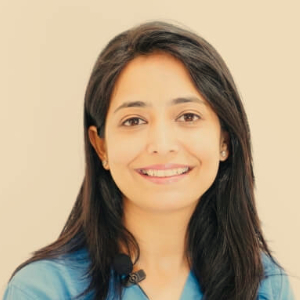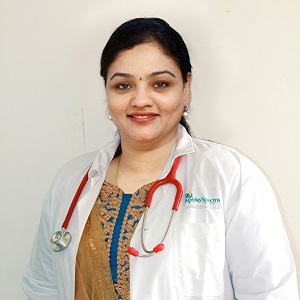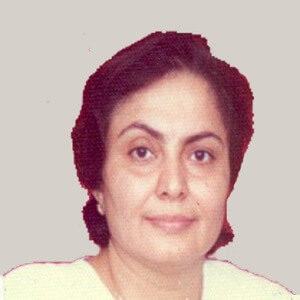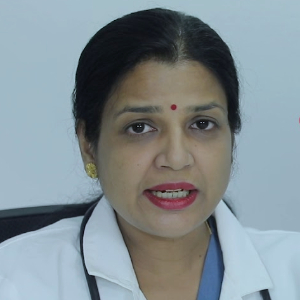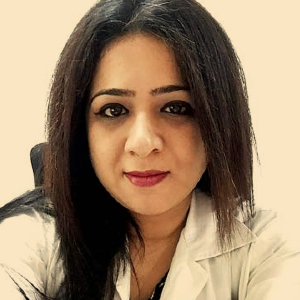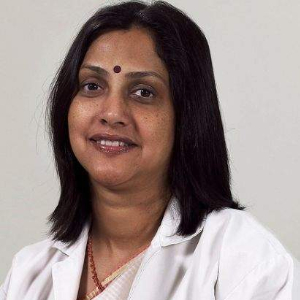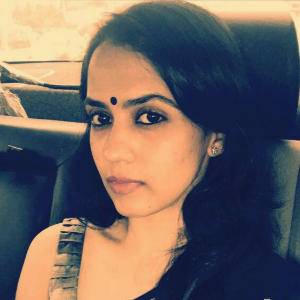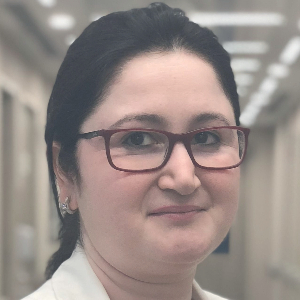Best Doctors in India for Robotic Hysterectomy
- IVF Specialist, Gynaecologist & Obstetrician; Mumbai, India
- Over 10 years’ experience
Profile Highlights:
- Dr. Ritu Hinduja is a renowned Infertility expert in Mumbai with experience in the management of infertility and reproductive medicine and has training in all assisted reproduction techniques (ART).
- She holds a Masters degree in Reproductive Medicine and also has a Diploma in the same field from Keil University in Germany.
- Dr. Hinduja’s primary interest lies in the management of patients with fertility issues that include low ovarian reserve and preserving fertility for cancer patients and women who want to delay childbearing by freezing eggs.
- Obstetrician & Gynaecologist, Chennai, India
- Over 22 years’ experience
Profile Highlights:
- Dr. Meenakshi Sundaram is a gynecologist and obstetrician in Chennai and has over 22 years of experience in these fields.
- She completed her MBBS from the Medical University (TNMGRMU) and Completed her MD in Obstetrics and Gynecology (Obstetrics and Gynecology) Medical University (TNMGRMU).
- Some of the services provided by the doctor are: Uterine Fibroid Treatment, Uterine Artery Ligation
- Obstetrician & Gynaecologist, New Delhi, India
- Over 39 years’ experience
Profile Highlights:
- Dr. Madhu Roy is one of the leading Gynecologists and Obstetricians in India, practicing successfully for about 39 years. Dr. Roy practices at Indraprastha Apollo Hospital as a Senior Consultant.
- She assists patients by treating Uterine Fibroids, ovarian cysts, Endometriosis, Robotic Surgery, Subfertility, Pelvic Organ Prolapse, Gynecological Cancers, and any other conditions with her experience.
- Dr. Madhu Roy also provides counseling on contraception, medical termination of pregnancy, biopsies, laparoscopic surgery, and fertility preservation procedures.
- IVF Specialist & Gynaecologist, Bengaluru, India
- Over 15 years’ experience
Profile Highlights:
- Dr. Pallavi Prasad is a well-known Gynecologist in Bengaluru specializing in infertility and IVF.
- Dr. Prasad is a specialist in all kinds of Artificial Reproductive Techniques (ART) including IVF, ICSI, IUI, and IMSI. She also provides services for vitrification and cryopreservation.
- Dr. Pallavi Prasad has also written articles and papers on her field of expertise and has published several columns on infertility and ART in renowned journals and newspapers.
- IVF Specialist & Gynaecologist, Mumbai, India
- Over 24 years’ experience
Profile Highlights:
- Dr. Sulbha Arora is a well-known Gynecologist and Obstetrician and an Infertility Specialist in Mumbai currently working with Nova IVI Fertility.
- She has 24+ years of experience in IVF and Assisted Reproductive Techniques (ART) and has helped a large number of women enjoy the happiness of motherhood.
- Her primary area of focus includes fertility medicine, fertility preservation, third-party reproduction, and ultrasound.
- IVF Specialist & Gynaecologist, Bengaluru, India
- Over 25 years’ experience
Profile Highlights:
- Dr. Aviva Pinto Rodrigues is a Consultant in Gynecology and Infertility and has an extensive experience of over 2 decades in Reproductive Medicine and holds a Diploma in the field from the University of Kiel in Germany.
- Her expertise lies in all forms of ART including IVF, IUI, ICSI, IMSI, and also finds interest in the treatment of genital tuberculosis and reproductive endocrinology.
- Obstetrician & Gynaecologist, Gurugram, India
- Over 30 years’ experience
Profile Highlights:
- Dr. Anjali Kumar is a renowned gynecological endoscopic surgeon, who has done certificate courses as well as training at the World Association of Laparoscopic Surgeons and Ethicon Endosurgery Institute in New Delhi.
- Her technique was presented, published, and also accepted at the apex national conference at the Kumar’s Technique. She has also featured in several talk shows in different shows in multiple TV channels like NDTV, Doordarshan, The People, Khabrein Aaj Tak, etc.
- IVF Specialist & Gynaecologist, Mumbai, India
- Over 17 years’ experience
Profile Highlights:
- Dr. Sneha Sathe is a consultant gynecologist and infertility specialist in Mumbai and associated with Nova IVI Fertility.
- She has close to a decade of experience in the field of ART and Reproductive medicine and has achieved several successful pregnancies through IVF, IUI, ICSI, and other techniques of assisted reproduction.
- Dr. Sneha Sathe finds special interest in mild IVF and is also experienced in other aspects of gynecology such as management of PCOS, recurrent implantation failure, endometriosis, and failed IVF cycles.
- IVF Specialist & Gynaecologist, Gurugram, India
- Over 18 years' experience
Profile Highlights:
- Dr. Meenakshi Dua is a well-known gynecologist in India specializing in IVF and Infertility.
- She has an experience of 18+ years in the field of infertility treatment and has helped a large number of people with infertility issues.
- Dr. Meenakshi Dua is an expert in all kinds of Assisted Reproductive Technology and is highly trained in reproductive endocrinology, fetal Doppler, and advanced-level ultrasounds in gynecology and obstetrics.
- Obstetrician & Gynaecologist, New Delhi, India
- Over 20 years’ experience
Profile Highlights:
- A qualified and reputed medical practitioner Dr. Asawari Kesari Kapoor is among the celebrated gynecologists and obstetrician doctors in Delhi. With years of experience, she is proficient in identifying, diagnosing, and treating various health issues and problems related to her field.
- Dr. Asawari Kesari Kapoor completed her MBBS from the University of Mumbai, in 1999, and her DGO from the same university in 2002.
- She later got her diploma in Gynecology and Obstetrics from the College of Physicians and Surgeons in 2004. She is currently practicing as a Senior Consultant at Indraprastha Apollo Hospitals.
Best Hospitals in India for Robotic Hysterectomy
Pushpawati Singhania Hospital & Research Institute, New Delhi
- City: New Delhi, India
Hospital Highlights:
- Established in 1996, Pushpawati Singhania Research Institute is one of the top hospitals in the NCR region, as well as one of the top facilities in India for gastroenterology. The hospital is one of South Asia’s first institutes in medical and surgical treatment for diseases related to digestion.
- The hospital is equipped with state-of-the art facilities coupled with the latest equipment as well as renowned consultants from various parts of India as well as other parts of the world.
W Pratiksha Hospital, Gurgaon
- City: Gurugram, India
Hospital Highlights:
- W Pratiksha Hospital, Gurugram, is one of the best hospitals in the NCR region. It is also a top hospital in India for IVF. Since its inception, the hospital has performed over 5500 successful IVFs. The hospital also specializes in gynecology.
- With over 20 years of experience in providing quality healthcare, the hospital is known as one of the most trusted and valued health providers in India.
- Equipped with world-class medical facilities and advanced technology, the hospital’s doctors and clinicians also have a track record of delivering excellent results. The hospital is also known for focusing on preventive well-being as much as on curative treatment.
- The hospital has earned the trust of its patients, by providing the best available treatments at affordable costs.
Narayana Superspeciality Hospital, Gurugram
- City: Gurugram, India
Hospital Highlights:
- Situated near DLF Cyber City, Gurugram, Narayana Superspecialty Hospital is one of the top medical facilities in the Delhi NCR region, catering to the needs of the people. Known for its commitment to quality medical care and patient service, the hospital is a state-of-the-art facility with planned and well-equipped sections, which includes a spacious OPD area as well as comfortable patient rooms.
- It is the closest super-specialty hospital from Indira Gandhi International Airport towards Gurugram, and also the nearest super specialty hospital from DLF Cyber City. It is also close to major residential areas in Gurugram.
- It is part of the renowned Narayana Health Group. Established in 2000, by Dr. Devi Shetty, a renowned cardiac surgeon, it has grown to be one fo India’s leading healthcare groups.
Sir Ganga Ram Hospital, New Delhi
- City: New Delhi, India
Hospital Highlights:
- Sir Ganga Ram Hospital, New Delhi is known to provide the latest medical procedures with the latest technology in all of its units.
- The hospital has a team of reputed doctors, nurses, and healthcare professionals that ensure that patients receive quality care at affordable costs.
- Staffed with a team of highly qualified doctors, dedicated nurses, and paramedical and non-medical staff, the hospital aims to lead in healthcare delivery, medical education, training, and research.
- As per the vision of the founder, the hospital also provides free treatment to the economically weaker sections of society.
- Sir Ganga Ram Hospital also provides training to young doctors under the Diplomate in National Board(DNB) program. The DNB program at the hospital was started in 1984 and it is known for currently running the maximum number of DNB specialties in the country. It also has the distinction of having the first bone bank in India.
CK Birla Hospital, Gurugram
- City: Gurugram, India
Hospital Highlights:
- The CK Birla Hospital in Gurugram is a NABH-accredited multi-specialty hospital.
- The hospital strives to increase the quality of healthcare by focusing on UK NHS nurse and midwife training requirements. Policies and practices derived from the National Institute for Health and Treatment Excellence (NICE) recommendations in the United Kingdom ensuring that a strong focus on safety, high-quality clinical care, and sanitation is maintained.
- The hospital’s cutting-edge technology and facilities allow for real-time communication and seamless collaboration among caregivers, ensuring accuracy and the best possible results. Those with foreign experience and accreditations make up part of the hospital’s team of clinicians.
KIMS Hospital, Hyderabad
- City: Hyderabad, India
Hospital Highlights:
- KIMS Hospital (a brand name of Krishna Institute of Medical Sciences) is one of the largest and best multi-speciality hospitals in Hyderabad. The hospital provides various treatments to an enormous number of patients.
- The hospital has a capacity of more than 3000 beds. KIMS Hospitals offers different healthcare services in more than 25 specialities and super specialities.
- The hospital is equipped with modern medical equipment and technology. It has robotic equipment to provide minimal invasive techniques for patients.
- The hospital is aimed at providing world-class healthcare facilities and services at an affordable cost for patients.
- The various specialities and departments of the hospital include neurosciences, gastroenterology & hepatology, robotic science, reproductive sciences, dental science, oncological sciences, organ transplantation, heart and lung transplantation and mother and child care.
Fortis Hospital, Shalimar Bagh
- City: New Delhi, India
Hospital Highlights:
- Fortis Hospital in Shalimar Bagh is a multi-super specialty hospital that strives to provide world-class patient care by leaving no stone unturned.
- Fortis, Shalimar Bagh, with 262 beds and a 7.34-acre footprint, provides the best level of medical care through its team of doctors, nurses, technicians, and management professionals.
Reliance Hospital, Mumbai
- City: Mumbai, India
Hospital Highlights:
- Reliance Hospital is one of the best super-specialty care hospitals in Navi Mumbai.
- The main purpose of this hospital is to become a trustworthy place for the best health and hope for society. The hospital is well connected to the suburbs of Mumbai and Navi Mumbai.
- The hospital has various specialty departments, viz., Accident & Emergency, Anesthesiology, Dental Services, Dermatology, Diabetology, Dietetics Nutrition, Endocrinology, ENT, Gastroenterology, General Surgery, Gynaecology And Obstetrics, Hepato Pancreato Biliary Surgery, Infectious Disease, Internal Medicine, Interventional Radiology, Laboratory Medicine, Minimal Access Laparoscopic Surgery, Nephrology, Neurosciences, Opthalmology, Orthopaedics, Paediatrics, Pain Management Palliative Care, Physical Medicine Rehabilitation, Plastic And Reconstructive Surgery, Psychiatry, Pulmonary Medicine, Radiology, Rheumatology, Transplant, Urology Andrology, Vascular Surgery
Lilavati Hospital & Research Centre, Mumbai
- City: Mumbai, India
Hospital Highlights:
- Lilavati Hospital & Research Centre is India’s premier multi-speciality tertiary care hospital and has been recognised as a global medical excellence centre.
- Lilavati Hospital & Research Centre has built an unrivalled level of trust with its patients over the years, thanks to a solid foundation that comprises cutting-edge facilities, the best medical competence, research, education, and charity endeavours.
- The hospital is quite proud of the fact that it now serves patients from all kinds of backgrounds, not just from the United States but from all around the world.
- The hospital has a total of 323 beds, one of the largest Intensive Care Units (ICUs), 12 Operation Theatres with modern amenities, over 300 consultants, and almost 1,800 personnel.
Venkateshwar Hospital, Dwarka, New Delhi
- City: New Delhi, India
Hospital Highlights:
- State-of-the-art technology and devoted healthcare professionals have been brought together under one roof at Venkateshwar Hospital to provide genuine medical care. The hospital’s professionals work together as a team to deliver the best possible treatment to their patients, using the most sophisticated equipment and information technology.
- Venkateshwar Hospital’s mission is to attain global excellence in healthcare by employing evidence-based, ethical clinical practices and cutting-edge technology by a team of highly skilled experts.
Robotic Hysterectomy
The surgical removal of a woman’s uterus is termed as hysterectomy. This surgery is generally done through a small incision with the help of a thin, lighted scope with a camera on its end.
In a robotic-assisted laparoscopic hysterectomy, the surgeon makes the use of a computer for controlling the surgical instruments. The computer is operated from an operating room. The surgeon controls the robot’s movements steadily and precisely with the help of the computer. This lets him/her get into smaller spaces more easily as compared with conventional laparoscopic surgery.
Purpose
Hysterectomies are performed to treat several conditions, which include:
- Uterine fibroids
- Cancer or precancer of the uterus, ovaries or cervix
- Endometriosis
- Uterine prolapse
- Pelvic pain
- Abnormal vaginal bleeding
Robotic hysterectomy is recommended by your doctor if he/she feels that you are not a candidate for regular hysterectomy due to your medical history. If you have some surgical scars or some irregularity in the pelvic organs, that limits your options.
Preparation
It is likely that you will need some physical exams before the tests. Some of the tests your surgeon can order might include blood tests, a chest X-ray or an electrocardiogram. Let your surgeon known if you are taking any medications or supplements. It is likely that your surgeon will recommend you against taking aspirin or any other medications that thin your blood and can increase bleeding.
If anyone in your family has any history of a bad reaction to general anesthesia, let your healthcare provider know. It is also important to stop smoking as it can interfere with your healing process.
You will need to fast for some time prior to your surgery. If you will receive general anesthesia, it is important to consume nothing after midnight for at least eight hours before your surgery.
You can discuss with your surgeon whether you should continue to take your regular medications on the morning of the procedure.
Procedure
First, you will need to lie on your back. You might have a urinary catheter inserted for emptying the bladder. A member of your surgical team then cleans the surgical area with a sterile solution before your surgery.
After you are given an anesthetic, your doctor will create a few small surgical cuts in your abdomen and insert slender surgical instruments through them.
During the procedure, your surgeon will need to use control devices for directing the surgical instruments that will be removing the uterus.
Depending on your condition, your surgeon might also need to remove one or both of your ovaries and your fallopian tubes. While the surgeon performs the operation, an assistant at the operating table will reposition the instruments and add or remove any surgical devices as needed. He/she will provide any other support to the surgeon if required.
Your uterus is then cut into small pieces so that they are removable through the small incisions. Depending on the reasons for your procedure, your whole uterus might be removed or just the part above your cervix.
After the procedure
After the surgery, you will be taken to a recovery room to be monitored as you recover from the anesthesia. Most people generally require a stay for a few days at the hospital. You might experience some pain after this procedure. To control it, you will likely receive pain medicine through your IV. Once you are able to drink fluids and your bowels start to pass gas, your IV will be removed.
Within a few days, your bladder catheter is going to be removed. You might experience bleeding from your vagina which requires the use of pads. You will be encouraged to get up and walk as soon as you can. This can help in the prevention of blood clots from forming in your legs. You might also receive pain medicine that can help prevent blood clots. Caregivers might help you with your daily tasks.
Once you are home, it is important to follow all instructions provided by your surgeon. You also need to take medications as directed. Make sure that you keep your follow-up appointments.
You need to keep the incision areas dry for a few days. Follow your surgeon’s instructions regarding bathing and dressing care. You might need to go back to him/her to have your stitches removed. In a few days, you should gradually be able to resume your daily activities. Avoid lifting heavy objects for a few weeks. Discuss with your surgeon when you will be able to return to specific activities.
You might continue to have light bleeding from your vagina. You might also receive instructions not to put anything into your vagina for around 6 weeks.
Complete recovery should take anywhere between a few weeks to a few months.
If you experience any of the following, inform your surgeon:
- Increasing pain or pain that medication is not able to relieve
- Chest pain or shortness of breath
- Pain or swelling in your legs
- Any drainage, redness, bleeding or swelling from the incision areas
- Fever
- Heavy vaginal bleeding
In addition to the physical symptoms of recovery, you might also experience a few emotional symptoms. After this procedure, pregnancy is no longer possible and your periods are going to stop as well.
If your ovaries were also removed as part of this procedure, then you might notice few symptoms of menopause such as hot flashes as well as vaginal dryness. Some women might benefit from hormone therapy after going through a hysterectomy. You can choose to discuss this with your doctor.
Risks
A robotic hysterectomy is generally a safe procedure, but like all surgeries, it has a few risks, which include:
- Heavy bleeding
- Blood clots in the legs or lungs
- Infection
- Adverse reaction to the anesthetic
- Damage to the bladder or any nearby organ

